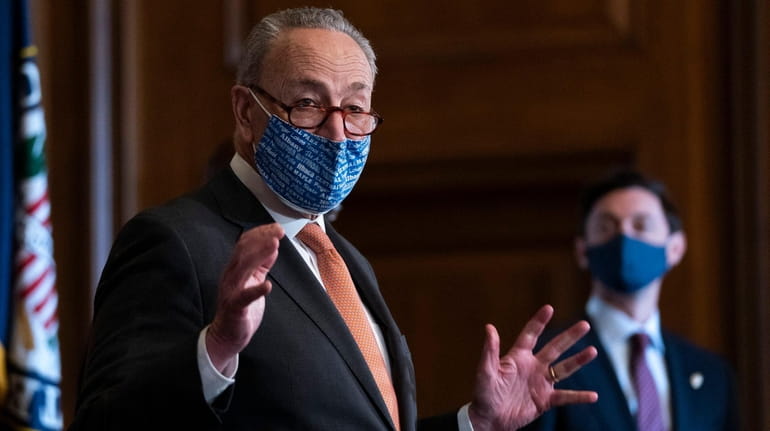The impact of the latest Trump impeachment is blowin' in the political wind

Senate Majority Leader Chuck Schumer (D-N.Y.) vows "there will be a trial" for ex-President Donald Trump. Credit: TNS / Getty Images / Drew Angerer
If impeachment were more like an ordinary criminal prosecution, you'd expect the prospect of a plea bargain to get an airing in the latest case against former President Donald Trump.
Clearly, Trump while president urged a militant crowd of supporters on Jan. 6 to "fight like hell" to prop up the fiction that he'd won the November election. They marched to the Capitol, where some committed violent and lethal acts in disrupting legal proceedings. The charge that he incited an insurrection sounds way more plausible, or at least much less ridiculous, than his treacherous claims of "massive" vote fraud.
But Trump can no longer can be removed from office — and removal is ordinarily the point of an impeachment. Senate Majority Leader Chuck Schumer (D-N.Y.) dismisses GOP assertions that Trump's job status would make the proceedings legally void.
"Make no mistake, there will be a trial," Schumer said Friday. "And when that trial ends, senators will have to decide whether they believe Donald John Trump incited the insurrection."
Forcing Republicans who serve in a body that came under attack to record their stances seems to be one key point of the exercise. Another is that by convicting Trump in the trial, set to begin the week of Feb. 8, the Senate can then vote separately to disqualify him from holding federal office in the future, a restraint some in the GOP might find attractive.
Conviction requires a two-thirds vote in the Senate. Currently the seats are split 50-50 between the major parties, with Vice President Kamala Harris available to decide tie votes.
Again, impeachment is a legislative process, not a criminal procedure requiring unbiased jurors — as Trump's last trial and acquittal proved one year ago.
For purposes of symbolism and solidarity, both sides might discuss other options.
Two weeks ago, a half-dozen House Republicans proposed a resolution censuring Trump instead of impeaching him. Offering that choice in the Senate, even later on, could keep the Congress from turning its focus away from President Joe Biden's massive coronavirus proposals and key Cabinet nominations.
Could a censure resolution become a bargaining chip in legislative dealings ahead? That's tough to predict.
Trump has figuratively slipped the cuffs twice. The first time, the Mueller report on Russian election meddling gave Congress a clear path to an obstruction charge that House Democrats did not pursue. Last year, Trump was impeached in the House over the Ukraine scandal and acquitted in the Senate with only one Republican member, Mitt Romney, voting to convict.
Perhaps it's a good time to recall that Trump's mentor, the late attorney Roy Cohn, was indicted four times between the mid-1960s and early 1970s. Charges included stock swindles, obstructing justice, perjury, bribery, conspiracy, extortion and false filings.
Cohn was acquitted three times and got a mistrial the fourth. But he was disbarred, and he was sued by the IRS for $7 million in back taxes and penalties. For some of our most dubious public figures, legal comeuppance takes a very long time.

